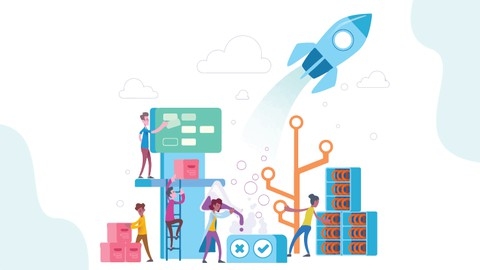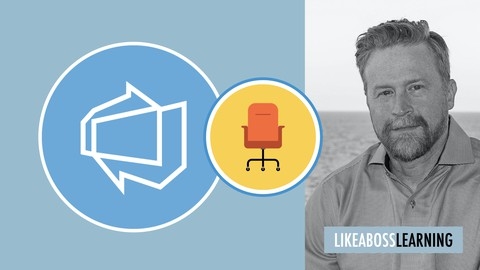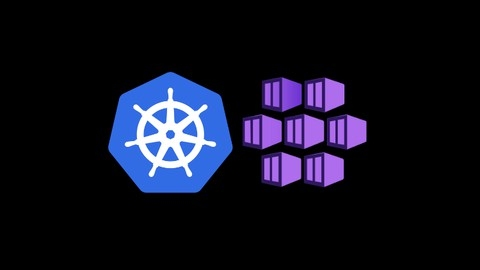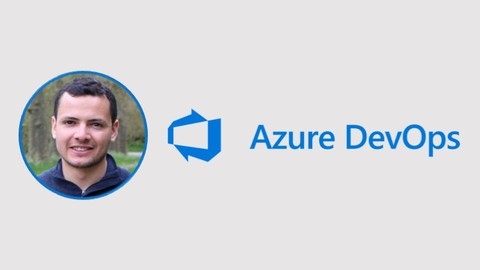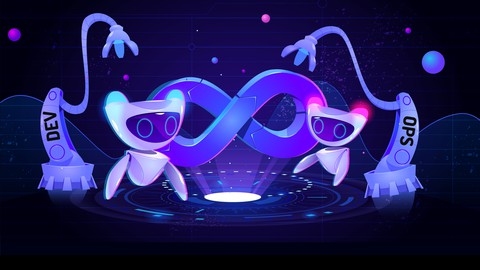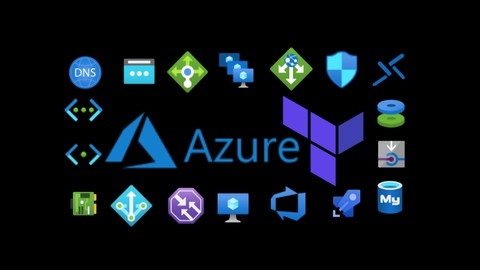Azure DevOps is a comprehensive platform that helps businesses streamline their software development lifecycle by automating builds, testing, and deployment processes.
It’s a powerful tool that can significantly boost efficiency and enhance the quality of your applications.
By mastering Azure DevOps, you can take your development career to the next level and become a highly sought-after professional in today’s tech-driven world.
Finding the right Azure DevOps course on Udemy can be a challenge, with so many options available.
You want a course that’s both informative and engaging, taught by experienced professionals, and tailored to your learning style and goals.
After reviewing countless courses, we recommend Azure DevOps Fundamentals for Beginners as the best course overall on Udemy.
This course stands out for its comprehensive coverage of key Azure DevOps concepts, from setting up projects to managing pipelines and deploying applications.
It’s taught by industry experts who provide clear explanations and practical examples, making it an ideal choice for learners of all levels.
While this is our top pick, there are many other great courses on Udemy that focus on specific aspects of Azure DevOps.
Keep reading to explore our full list of recommendations and find the perfect course for your journey.
Azure DevOps Fundamentals for Beginners
The course starts by introducing you to the world of DevOps and explaining why it’s important.
You’ll learn what Azure DevOps is and how to create a project within it.
The course then dives into Azure Boards, where you’ll define teams, work items, sprints, features, and epics.
You’ll explore different board views and learn how to use Azure Boards with GitHub.
Next up is Azure Repositories.
You’ll understand code management with Azure Repos, the difference between Git and GitHub, and how to create a code repository.
The course walks you through committing changes, performing pull requests, working with code locally, managing commit history, and cleaning up repos.
One of the core DevOps concepts is building and deploying code, which is covered in the Azure Pipelines section.
You’ll learn about DevOps pipelines, builds vs releases, and how to create build and release pipelines.
The course even troubleshoots a real-world pipeline deployment for a game called Flatris.
Testing is crucial in DevOps, so the course teaches you about test plans and different types of tests.
You’ll create a manual test plan and run a URL load test.
Towards the end, you’ll get hands-on experience creating a CI/CD training pipeline together.
The course wraps up by discussing next steps for your DevOps journey.
Azure DevOps Boards for Project Managers/Analyst/Developers
You’ll start by learning how to create teams and epics within Azure DevOps (formerly known as VSTS or TFS).
From there, you’ll dive into breaking down those epics into features, product backlogs, and tasks - the building blocks of any project.
But it doesn’t stop at just creating work items.
The course teaches you how to leverage powerful features like task boards to visualize and manage your workflow.
You’ll also learn to create queries, charts, and customized dashboards to gain insights into your project’s progress.
Capacity planning is crucial for effective resource allocation.
This course guides you through integrating Azure DevOps with Excel and setting up notifications to stay on top of your team’s workload.
Plus, you’ll master the art of updating multiple work items simultaneously, saving you valuable time.
Customization is key in any project management tool.
You’ll learn how to create custom processes and work item types like “Tickets” to fit your unique needs.
And if you ever need a refresher, handy PDF notes are provided for quick reference.
The course culminates with a final assessment to test your knowledge of Azure DevOps and agile concepts.
Upon completion, you’ll receive a sneak peek into the “IT Business Analyst and Managers Technical Awareness” course, expanding your skillset even further.
Learn DevOps: Docker, Kubernetes, Terraform and Azure DevOps
You’ll start by mastering Docker and containerization, a crucial skill for working with Kubernetes.
The course guides you through building Docker images for Python, Node.js, and Java applications, pushing them to Docker Hub, and running microservices with Docker Compose.
Next, you’ll dive into Kubernetes itself, provisioning clusters on Google Kubernetes Engine (GKE) and Amazon Elastic Kubernetes Service (EKS).
You’ll deploy your first container to a Kubernetes cluster, grasping core concepts like Pods, ReplicaSets, Deployments, and Services.
The course covers generating Kubernetes YAML configuration, using labels and selectors, and configuring multiple deployments with one service.
For microservices, you’ll learn service discovery via environment variables and DNS, centralized configuration with ConfigMaps, and simplifying access with Ingress.
Infrastructure as Code (IaC) is another major focus, with hands-on experience using Terraform to provision AWS resources like S3 buckets, IAM users, EC2 instances, and load balancers.
You’ll store Terraform state remotely, use workspaces and modules for multiple environments, and integrate Terraform with Azure DevOps for automated Kubernetes cluster provisioning.
The course extensively covers CI/CD pipelines in Azure DevOps, from creating your first pipeline to using stages, variables, artifacts, deployment jobs, approvals, and releases.
You’ll build and push Docker images directly from Azure DevOps pipelines and deploy to AKS and EKS clusters provisioned with Terraform.
Other key topics include Azure DevOps boards/backlogs, Jenkins pipelines for CI, and configuration management with Ansible for automating app deployment.
You’ll get exposure to Visual Studio Code, microservices architecture, AWS/Azure cloud onboarding, and overarching DevOps best practices.
GIT and Visual Studio with Azure DevOps Repos for Developers
You’ll start by learning how to set up Azure Repos and Git, including installing Git on your machine.
From there, you’ll dive into the core functionality of working with repos.
You’ll learn how to create a new project and push it to a repo, as well as how to clone an existing repo to your local machine.
The course will teach you how to manage permissions for your code and troubleshoot any proxy issues that may arise.
One of the key aspects of Git is working with branches, and this course will guide you through that process.
You’ll learn how to create, switch between, and merge branches, as well as how to handle merge conflicts when they occur.
Committing your changes is a crucial part of the Git workflow, and the course covers that in depth.
You’ll learn how to save your work with commits, fetch and pull changes from remote repos, sync your local repo, and even link commits to work items in Azure DevOps.
The course also covers more advanced topics like staging files, ignoring files with .gitignore, viewing commit history and comparing changes, reverting commits, and amending previous commits.
Before creating a pull request, you’ll learn how to update your branch from the master branch.
The course then walks you through the pull request and code review process, as well as setting up branch policies.
Other topics covered include working with tags, cherry-picking commits, forking repos, and stashing your code.
The course also includes a quick reference guide in PDF format for easy reference.
Finally, the course covers using Git with both Visual Studio 2017 and Visual Studio 2019, including older versions of the content for those still using previous versions of the software.
Azure Devops Crash Course -Build CI/CD release pipelines
This comprehensive course takes you on a journey into the world of Azure DevOps, equipping you with the skills to build robust Continuous Integration and Continuous Delivery (CI/CD) pipelines.
You’ll start by familiarizing yourself with the Azure DevOps portal, grasping the core concepts of deployment, and setting up your very first pipeline.
Building a “Hello World” application will solidify your understanding, as you deploy it to a Tomcat server and configure both build and release pipelines.
The course meticulously breaks down crucial concepts like continuous integration and delivery, guiding you through their practical implementation in your projects.
Prepare for hands-on experience as you create build pipelines, delve into their configurations and logs, and learn how to seamlessly integrate continuous integration into your pipelines for every code commit, ensuring a smooth and efficient development workflow.
The course then elevates you to a higher level, introducing release pipelines and the wealth of resources available within Azure.
You’ll master the art of setting up release pipelines with Linux resources, deploying artifacts, and seamlessly integrating your projects with Docker Hub.
Your journey extends to the realm of Docker, where you’ll understand how this powerful tool automates tasks and enables the creation of containerized applications.
You’ll explore the differences between virtual machines and containers, master Docker installation, and learn to navigate Docker Hub effectively.
Beyond technical skills, the course emphasizes project management using Azure Boards.
You’ll become proficient in work items, sprint planning, and managing agile workflows, integrating your code repositories with project boards, creating branches, and managing pull requests for your projects with ease.
Finally, you’ll delve into the fundamentals of Git, a widely adopted version control system in software development.
You’ll learn to create repositories, push code to remote repositories, stage and commit changes, and grasp the importance of branching and merging.
This comprehensive approach ensures you’re well-equipped to manage your code effectively.
Azure Kubernetes Service with Azure DevOps and Terraform
This course covers everything from setting up an Azure Kubernetes Service (AKS) cluster to deploying applications using Terraform and Azure DevOps pipelines.
It starts by introducing you to AKS and guiding you through creating a cluster.
You’ll learn how to explore the cluster using kubectl and the Azure management console, set up the Azure CLI locally, and deploy a sample application to test the cluster.
Next, you’ll dive into Docker fundamentals, including understanding Docker architecture, installing Docker, pulling and building Docker images, and essential Docker commands.
This lays the foundation for working with containerized applications on Kubernetes.
The course then provides a thorough understanding of Kubernetes fundamentals, covering pods, services, replicasets, deployments, and more.
You’ll learn to create and manage these resources using both the imperative (kubectl) and declarative (YAML) approaches.
As you progress, you’ll explore various AKS storage options like Azure Disks, Azure MySQL Database, and Azure Files.
You’ll also learn about Kubernetes secrets and ingress, including context path-based routing, domain name-based routing, and SSL with Let’s Encrypt.
The course covers advanced topics like resource requests and limits, namespaces, virtual nodes, Azure Container Registry integration, and Azure DevOps pipelines for building and deploying Docker images to AKS.
You’ll learn to create pipelines from scratch, use release pipelines, and configure access to multiple AKS clusters.
Additionally, you’ll learn about Active Directory authentication for AKS admins, Kubernetes RBAC with Azure AD, cluster autoscaling, and horizontal pod autoscaling.
The course also teaches you how to create a production-grade AKS cluster using the Azure CLI, including setting up virtual networks, subnets, AD users, groups, and log analytics workspaces.
Finally, you’ll learn to provision AKS clusters using Terraform, both locally and with Azure DevOps pipelines.
You’ll understand Terraform basics, language syntax, input variables, and output values, and apply them to create AKS clusters with custom configurations.
CI/CD Pipelines using Azure DevOps
You’ll start by gaining a solid understanding of DevOps principles and how they contribute to faster and more efficient software delivery.
You’ll then dive into the features of Azure DevOps, learning how to manage your code, run automated tests, and deploy applications to the cloud using its integrated tools.
The course places strong emphasis on establishing a robust development environment.
You’ll learn to leverage the power of Visual Studio Code, a popular code editor, and master Git, the essential version control system for collaborative development.
You’ll gain practical skills in branching strategies and efficient code management through Git.
Next, you’ll delve into the crucial area of automated testing, discovering how to write unit tests that identify bugs early in the development lifecycle.
This practice ensures you deliver high-quality software with greater speed and efficiency.
The core of the course centers around CI/CD pipelines, the backbone of modern DevOps practices.
You’ll learn how to define and implement these pipelines using Azure DevOps, effectively automating the process of building, testing, and deploying your applications.
You’ll master the use of YAML, a powerful language for configuring pipeline steps and orchestrating complex workflows.
The course also explores the concept of Infrastructure as Code, a modern approach to managing cloud infrastructure using code instead of manual configuration.
You’ll gain an understanding of popular tools like Terraform and Ansible, learning how to provision and manage your cloud resources, including virtual machines and databases, in a consistent and scalable way.
Finally, you’ll put everything you’ve learned into practice through a comprehensive end-to-end project.
You’ll build a web application from scratch, set up its infrastructure using Infrastructure as Code principles, and deploy it using a fully automated CI/CD pipeline.
Learn Azure DevOps CI/CD pipelines
You’ll embark on a journey starting with the fundamentals of CI/CD and Azure DevOps architecture, exploring the various task types available.
The core of the course lies in its deep dive into YAML pipelines.
You’ll learn how to define stages, jobs, and steps to create your automated workflows, discovering the power of adding dependencies between stages and jobs for smooth and controlled deployments.
Practical demos showcase how to build CI/CD pipelines for technologies like Azure Container Apps, Kubernetes, and Terraform, bringing theory to life.
The course doesn’t shy away from advanced topics.
You’ll learn to integrate tools like Sonar Cloud for code quality analysis and WhiteSource Bolt for open-source security checks.
Infrastructure as code with Terraform, variable groups for managing pipeline settings, and triggering pipelines from other pipelines are just a few of the advanced concepts you’ll master.
Securing your pipelines is a critical focus.
You’ll explore different authentication methods, including service principals and managed identities, and learn to leverage the Azure DevOps CLI for efficient pipeline management.
The course even dives into Workload Identity (OIDC) for even more secure access.
Throughout the course, you’ll gain hands-on experience by creating CI/CD pipelines for popular technologies like Java, .NET Core, SQL Server databases, and mobile applications using Xamarin.
You’ll learn to manage secrets using Azure Key Vault and understand the implementation of build and release pipelines on pull requests.
Tools like Microsoft Defender for DevOps are introduced to enhance security, and you’ll gain a deep understanding of GitOps concepts with Argo-CD.
It’s packed with practical examples, real-world scenarios, and expert guidance to help you build robust and efficient CI/CD pipelines.
Azure DevOps for .NET Developer (CI/CD, Boards, Repo & Wiki)
This comprehensive course provides a deep dive into the world of Azure DevOps, equipping you with the skills to build and deploy .NET applications efficiently.
You’ll start by getting a firm grasp of the fundamentals of Azure DevOps, understanding its purpose and how it came to be.
The course then guides you through setting up your own Azure DevOps organization and project, walking you through the creation of user accounts, assigning permissions, and navigating the different types of Azure DevOps users.
Next, you’ll delve into the powerful world of Azure Boards, where you’ll learn the principles of Agile methodologies and master the art of managing work items like epics, tasks, and user stories.
You’ll be shown how to create sprints, assign work effectively, and utilize queries and charts to keep a close eye on your project’s progress.
The course then introduces you to the essential tools of Azure Repos and Git.
You’ll learn the fundamentals of Git, understand how to create and import repositories, and gain confidence in using commands like fetch, push, pull, and resolving conflicts.
You’ll also master the creation and use of pull requests for code review and merging changes.
Moving forward, you’ll discover the transformative power of CI/CD pipelines, learning how to automate the build, test, and deployment processes for your .NET applications.
You’ll be guided through creating CI/CD pipelines, deploying to multiple environments, and leveraging features like Deployment Slots and feature flags to streamline your workflow.
Finally, the course explores other valuable features of Azure DevOps, including Wiki Pages for documentation and Test Plans for managing and executing tests.
This well-rounded course will leave you with a deep understanding of Azure DevOps and its application in building and deploying .NET applications.
You’ll be proficient in using Azure Repos for version control, Azure Boards for task management, and CI/CD pipelines for automated deployments, ready to tackle real-world projects with confidence.
Terraform on Azure with IaC DevOps SRE | Real-World 25 Demos
You’ll embark on a journey from the fundamentals of Terraform to mastering complex Azure deployments using Infrastructure as Code (IaC) and DevOps principles.
Right from the start, you’ll be guided through the essential tools, including Terraform, VSCode, Azure CLI, and Git.
The course delves into Terraform’s core commands and syntax, equipping you with a solid understanding of configuration management, resource manipulation, and state management.
You’ll gain practical experience using Terraform Providers, essential for interacting with Azure services like Virtual Networks (VNETs), Subnets, Network Security Groups (NSGs), and Linux Virtual Machines (VMs).
The course doesn’t shy away from real-world scenarios.
You’ll build a 4-tier VNET using Terraform, followed by constructing Linux VMs, securing SSH access, and setting up Azure Bastion Host.
You’ll then explore Standard Load Balancers, deploying them both via the Azure portal and through Terraform, and progress to Virtual Machine Scale Sets (VMSSs) for managing large-scale deployments.
Key aspects like Azure Private and Public DNS zones, remote state storage using Azure Storage accounts, and Azure Traffic Manager are also covered in depth.
You’ll gain hands-on experience with Azure Application Gateways, including advanced configurations like context path routing, multisite hosting, SSL integration, and error page handling.
The course emphasizes the integration of Terraform with Azure DevOps, providing a practical understanding of IaC DevOps practices.
You’ll learn how to create build and release pipelines to automate your infrastructure deployments.
Moreover, you’ll gain valuable experience in building your own Terraform modules, publishing them to the Terraform Public Registry, and managing module sources.
With 25 practical demonstrations, “Terraform on Azure with IaC DevOps SRE” provides you with the skills and confidence to build, manage, and automate your Azure infrastructure efficiently.
This course empowers you to become a proficient Azure DevOps engineer, ready to tackle real-world challenges with confidence.
